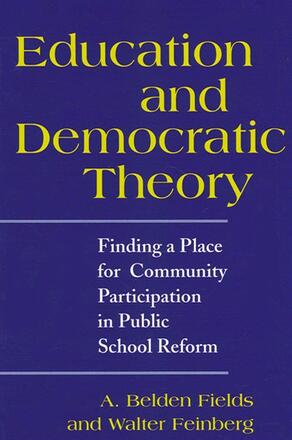
Education and Democratic Theory
Finding a Place for Community Participation in Public School Reform
Alternative formats available from:
A ground-breaking look at how access to decision making in the public schools can be extended to all, even previously excluded segments of the community.
Description
Winner of the 2001 American Educational Studies Association Critics' Choice Award
Much has been made of the gap between public schools and the communities that they serve. This book shows how a group of teachers, parents, and community people in "Ed City" formed an educational reform group—the Project for Educational Democracy—to increase access to decision making in their school system, especially for members of the community who had previously been excluded. A combination of ethnographic research and theoretical reflection, this book addresses concepts of community, authority, representation, participation, and democracy.
A. Belden Fields is Professor Emeritus of Political Science at the University of Illinois, Urbana. He is the author of Trotskyism and Maoism: Theory and Practice in France and the United States and Student Politics in France: A Study of the Union Nationale des Étudiants de France. >Walter Feinberg is Professor of the Philosophy of Education at the University of Illinois, Champaign. He is the author of Common Schools/Uncommon Identities: National Unity and Cultural Difference and On Higher Ground: Education and the Case for Affirmative Action.
Reviews
"Fields and Feinberg ought to be praised for not glossing over the very sticky problems associated with bringing members of previously excluded segments of community into educational decision making. " — Library Journal
"This is an important story about an issue of deep concern to educators and citizens alike, told in a way that is vivid and compelling—the problem of public participation and the future of our public schools and democratic life. The authors include many elements of good story-telling: the creation of tension, the attention to character and detail, an understanding of the flow of narrative energy. Ed City is a case that will be referred to for a long time in the discussion of democratic school change. " — William Ayers, author of A Kind and Just Parent: The Children of Juvenile Court
"…a very comfortable and competent consideration of the potential for democratic governance of education using a particular case study. The calmness of the book is refreshing in contrast to many highly ideologically charged works that know all the answers before the study begins. This book is also unusually responsible in its unwillingness to pin blame on any single 'devil,' instead considering the world as viewed by those in different positions interacting with one another. " — Eric Bredo, coeditor of Knowledge and Values in Social and Educational Research